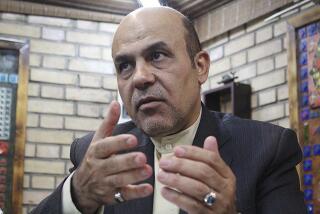THE IRANIAN ARMS CONNECTION : Even in a Deadly Cat-and-Mouse Game, Wags Can Be Found
- Share via
CHICAGO — On a bitter night in January, 1984, U.S. customs agents working at O’Hare International Airport intercepted a shipment of F-5 jet fighter parts about to be shipped to an alleged London munitions buyer for Iran.
The crate, with parts worth $12,500 in cash, and much more in terms of their ability to keep F-5 fighters flying in Iran’s savage war with Iraq, was seized.
However, that was not enough for senior special agent Vincent S. Radosta. He wanted to know exactly where the parts were going.
His solution was simple: Find a substitute for the parts and let the crate go through.
“I found the perfect replacement,” he recalled last week: 52 pounds of Love Me Tender Chunks dog food.
At one level, for U.S. law enforcement officials the thwarting of Iran’s massive quest for American military equipment is a dead-serious effort--an effort aimed not only at enforcing the U.S. embargo against arms shipment to Iran but also at protecting the security of U.S. military supplies.
At another level, however, it is a highly personal cat-and-mouse game in which U.S. agents delight in playing jokes calculated to embarrass and infuriate their unseen adversaries.
In the case of the O’Hare jet fighter caper, customs agent Radosta raced out to a convenience store near the airport’s freight terminal and bought the substitute.
“It was the right weight, it compacted well and it was readily available,” he said, noting that the crate was eventually traced to a freight terminal at London’s Heathrow Airport where Iranian agents discovered the substitution as they were preparing to ship it to Tehran.
The situation was the same for customs agents last autumn at Denver’s Stapleton International Airport when they found more than half a ton of F-4 Phantom jet fighter parts about to be shipped to Chicago and then on to London and Tehran.
They too seized the parts but let the shipment go through--after replacing the vital aircraft parts with 1,128 pounds of sand, gravel and concrete.
It arrived in London on Oct. 31, “a little trick or treat gift for the ayatollah,” said a government official familiar with the substitution.
At times, there is also a lighter side to the undercover and “sting” operations--moments when U.S. agents can smile at the difficulties that plague Iranians and Americans alike in the nether world of international arms smuggling.
Last year in Los Angeles, for example, Iran was prepared to pay $1.2 million for advanced “over-the-horizon” radar equipment. The entire payment disappeared. Not only did Iran lose $1.2 million, but customs agents, who had been prepared to arrest the smugglers once the transaction was completed, were forced to stay undercover nearly a year longer to make the case.
At one point, the Iranian air force colonel dispatched from London to oversee the $1.2-million deal complained to undercover agents that one of his Portuguese brokers had stolen the money.
The broker in turn claimed that the colonel and another partner “took all but $200,000.” And federal investigators said the colonel was last seen driving around London in a new Rolls-Royce.
“We hear he told his superiors back home in Tehran that the dirty Americans stole the money,” a customs official said.
More to Read
Sign up for Essential California
The most important California stories and recommendations in your inbox every morning.
You may occasionally receive promotional content from the Los Angeles Times.













